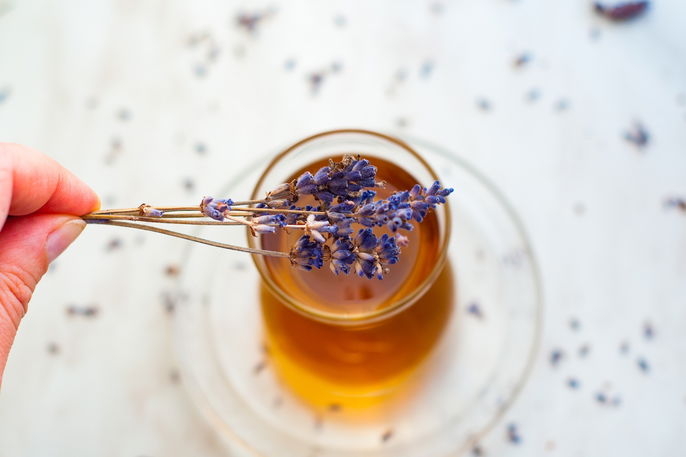What is it:
Lavender is a medicinal plant, of the Lavandula angustifolia species, that is widely used to for the treatment of anxiety, depression, indigestion and insect bites, It contains many health benefits due to its relaxing, calming, antispasmodic, analgesic and antidepressant properties.
This plant can be used to prepare tea or baths, but its essential oil can also be used in aromatherapy or can also be applied directly to the skin.
Lavender can be purchased in health food stores, pharmacies and at farmer's markets. It should be used, and should be used as prescribed by a doctor or other healthcare professional with experience in medicinal plants.

Health benefits
A alfazema serve para tratar diversos problemas, apresentando vários benefícios para o corpo, como:
1. Reducing anxiety and agitation
Lavender is rich in volatile oils that help to reduce anxiety and agitation. These oils have a calming and sedative action, and can therefore be used to complement any prescribed medical treatment for these conditions.
2. Reducing blood pressure
Lavender, in the form of essential oil, can help to reduce blood pressure when used as an aromatherapy agent. It can be used as a complement to the medical treatment of hypertension.
3. Decreasing fever
Lavender can help reduce fever slowly, as one of its the properties is reducing body temperature.
Furthermore, because of its calming and sedative properties, lavender can help you to achieve a better night's sleep when you have a fever.
4. Promoting canker sore healing
Due to its healing, anti-inflammatory and analgesic properties, lavender can promote the healing of canker sores. It can also help to reduce pain, inflammation, irritation and the size of canker sores.
5. Stabilizing heart rate
Lavender can help to stabilize heart rates and decrease the heart's excitability. It may be beneficial for the treatment of heart palpitations, especially when used in aromatherapy.
6. Decreasing migraine pain
Due to its analgesic properties, lavender can help to reduce migraines and headaches, and relieve related symptoms like nausea, vomiting or increased sensitivity to light.
Lavender can be used to relieve acute migraine flare-ups, however it should not be used as a treatment to prevent attacks, as it may trigger flare-ups.
7. Promoting relaxation
Lavender possesses calming and sedative properties, which promote relaxation of the body and reduce anxiety.
8. Improving sleep quality
Lavender helps to improve the quality and duration of sleep and can combat insomnia. It contains calming effects that promote relaxation and reduce agitation.
9. Reducing stress
Lavender helps to reduce stress as it has calming, sedative and relaxing properties.
10. Combating depression
Due to its anxiolytic and antidepressant properties, lavender can help with the treatment of depression and anxiety. It promotes body relaxation and increases sleep quality.
Nonetheless, lavender should not replace medical treatment prescribed by your doctor. You can use it, instead, to complement the treatment indicated by the doctor.
How to take lavender
The part that are most commonly used of the lavender are its flowers, leaves and stem. It can be used to make tea, essential oil or added to culinary recipes.
1. Lavender tea
Lavender tea is great for treating digestion problems, migraines, anxiety and menstrual cramps.
Ingredients:
- 1 teaspoon of lavender flowers
- 1 cup of boiling water
How to prepare:
Add the lavender flowers to the cup of boiling water and let it infuse for 5 to 10 minutes. Then strain, wait for it to cool and drink. This tea can be taken up to 3 times a day, and is recommended after each main meal.
2. Warm lavender bath
A warm lavender bath contains excellent relaxing, calming and tranquilizing effects that can help to treat excess stress, anxiety and sleep problems. To prepare a lavender bath, simply add 100 g of dried lavender flowers or 6-7 drops of the plant's essential oil to the hot water in a tub.
Another way to use lavender in the bath is to place 100 g of lavender flowers in a thin cloth and tie it up to make a bag. Secure the bag on the the shower head using a string. The water will come in contact with the plant and will spread its medicinal properties throughout the body. Instead of dried flowers, the plant's essential oil can also be used, and can be added to chamomile or mint tea bags hanging from the shower head. .
To treat sleep and stress problems, bags with dried flowers of the plant can also be placed under your pillow, so that they can act overnight.
3. Essential oil massage
A massage with lavender essential oil on the temples is particularly recommended for soothing headaches that are caused by stress and muscle tension. To perform this massage, rub 4 to 5 drops of essential oil on your fingertips and then massage your temples in circular movements for a few minutes.
If you feel that the headache is caused by tension in the neck, then extend your massage from the temples to the back of the neck, also in circular movements.
Furthermore, due to its calming properties, the essential oil can also be used to treat insect bites. You can apply 1 to 2 drops of oil directly on the bite.
Possible side effects
The main side effect of lavender is drowsiness, due to its relaxing and calming properties. However, this only occurs when it is ingested in excessive doses.
High doses of lavender can also cause constipation, contact dermatitis, confusion and blood in the urine.
Contraindications for use
Lavender should not be used by children under 12 years of age, nor by patients with gastritis or gastric ulcers. It is also not recommended for pregnant or breastfeeding women.
Because it can cause drowsiness, ingesting lavender is not recommended while driving vehicles or heavy machinery.
In addition, You are advised not to ingest lavender together with medicines or substances that depress the central nervous system, like alcohol,, drugs or hypnotic and anxiolytic medications.






























